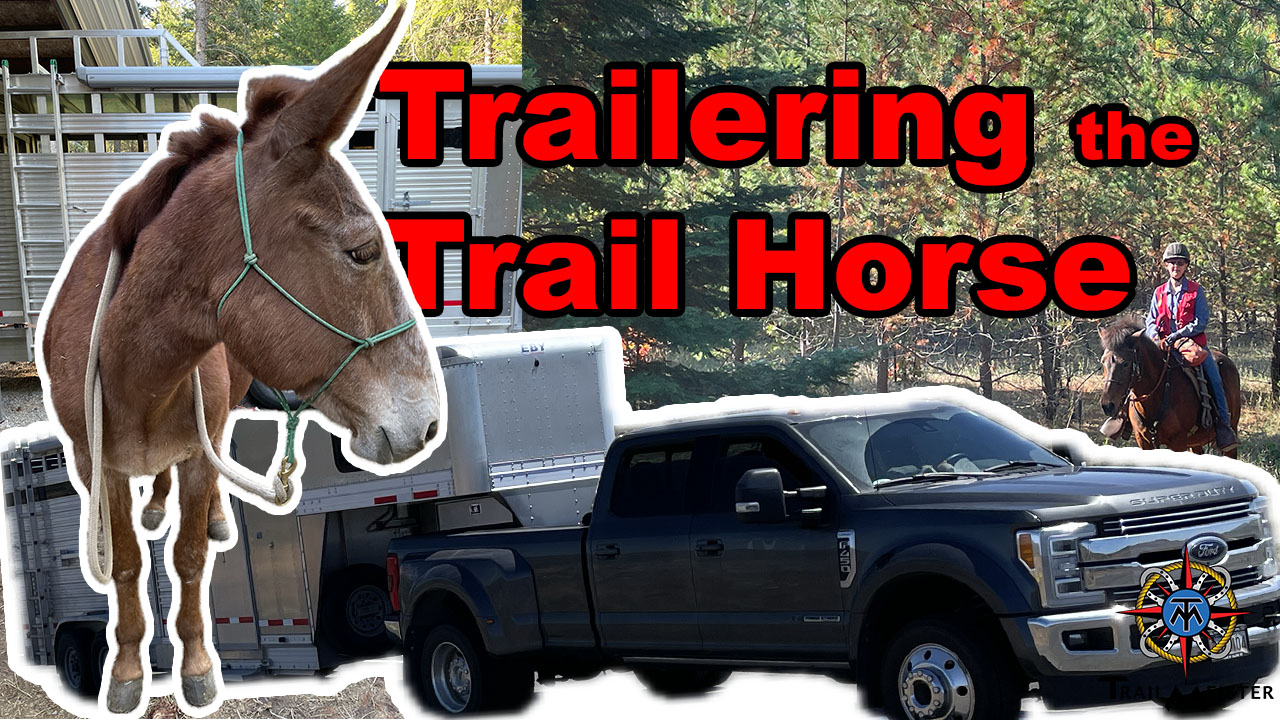With summer upon us, trail riders are eager to hit the trails. For many of us, this means loading the horses and mules and hauling them to trailheads and horse camps across the nation. However, trailering a horse involves much more than simply hitching up a trailer and hitting the road. Preparation, proper training, and mindful driving practices are required to ensure the safety and comfort of our equine friends and us!
Training for Trailering
A successful trail ride begins long before reaching the trailhead. One critical aspect of trailering is training your horse to feel comfortable inside the trailer. As we might feel uneasy riding in a noisy, bumpy, and drafty trailer, horses can be apprehensive about entering this dark, unfamiliar space. With enough time and patience, most horses can be trained to tolerate and even become comfortable with trailering.
If you’ve ever dealt with a horse that refuses to load or races out of the trailer, you understand the frustration this causes. The key is to practice obedience and calmness on the ground. Start by asking your horse to walk forward, stand quietly, and back up on command. The goal is for your horse to walk quietly into the trailer, stand there for a bit, and then calmly back out when asked. This process requires patience, trust, and a lot of groundwork, but it pays off. Once your horse learns to load consistently, it should be able to step into any trailer when asked and unload easily at your destination. A quiet and confident horse makes for a pleasant ride for both of you.
Driving Techniques for Safety and Comfort
While it may seem obvious, it’s important to remember that driving with a horse trailer is vastly different from driving a car. The weight and length of the trailer, combined with the equine cargo inside, necessitate a different approach. When you’re out on the open road, driving a trailer might seem similar to driving your family car, but it’s what happens at either end of the trip that can be daunting for first-time horse trailer drivers. Many popular horse camping areas are off the beaten path, often requiring navigation of steep hills and rough terrain. (You can find loads of horse trails and camps to explore at www.TrailMeister.com) Proper preparation and understanding of how to handle these challenges are crucial to an uneventful outing.
One critical tip in trailering the trail horse is to use your brakes sparingly when descending a grade. It may seem counterintuitive, but brakes are not meant to maintain a safe descent speed. Instead, use your brakes to slow down just enough to shift into a lower gear. The goal is to use your transmission to slow down and hold your speed in equilibrium without gaining or losing speed. This could mean using 1st or 2nd gear or even the 4WD low range. Driving a trailer like a car, with your foot constantly on the gas or brake pedal, will quickly wear out your brakes and could even compromise your safety.
Creating an Equine-Friendly Environment
Ensuring your horse’s comfort during the trip is essential. Two major factors to consider when trailering the trail horse are heat and your driving style. Horses have a comfort range of 30 to 75 degrees Fahrenheit, depending on the breed. On a warm, sunny day, the temperature inside a trailer can easily be 10 to 15 degrees higher than outside. To ease heat stress, schedule your trips to avoid the hottest parts of the day, ensure your horse is well-hydrated, and keep the trailer moving to benefit from the wind’s cooling effect. Open vents and windows to maximize airflow and check road conditions beforehand to avoid congestion.
Your driving habits significantly impact your horse’s comfort. Avoid sudden stops and starts. Horse trailers are long, heavy, and loaded with priceless cargo. Slow and steady movements allow your horse to adjust and brace itself. Careful braking and smooth cornering are also key. Take turns easily and resume normal speed only after straightening the rig. Additionally, take it easy on bumpy roads to minimize jostling inside the trailer.
One of the best ways to understand what your horse experiences during a trip is to ride inside your horse trailer. Find a large parking area or driveway and have a trusted person drive while you ride in the trailer. This exercise will give you firsthand experience of the bumps, turns, and stops your horse feels. It can cure bad driving habits.
For more detailed advice and resources on trailering the trail horse and other horse camping topics, visit www.TrailMeister.com. This site offers the largest source of authenticated horse trail and horse camp information in North America, making it an invaluable resource for trail riders.
By properly training your horse, understanding the unique driving techniques required for hauling a trailer, and creating a comfortable environment, you can ensure a safe and enjoyable trailering experience for both you and your horse. Proper trailering of the trail horse enhances the experience, builds trust, and ensures that future trips are as smooth and stress-free as possible.


